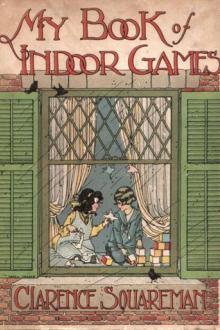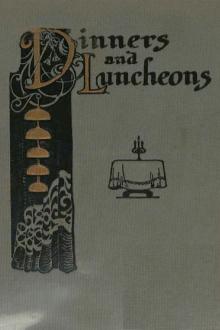My Book of Indoor Games, Clarence Squareman [primary phonics txt] 📗

- Author: Clarence Squareman
- Performer: -
Book online «My Book of Indoor Games, Clarence Squareman [primary phonics txt] 📗». Author Clarence Squareman
I fix upon you to find it."
The child touched must then guess who has the ring. If she guess correctly, she becomes the maid; if not, she must pay a forfeit. The maid then touches some one else and repeats the two lines given above. Each guesser may be allowed three trials.
The Forbidden LetterThe idea of this game is to try how many sentences can be spoken without containing a certain letter which has been agreed upon. Supposing, for instance, the letter "f" is not to be introduced; the first player might ask: "Is this a new game to you?" The second player could answer: "Oh, no! I played it years ago when quite a youngster."
He would perhaps turn to the third player, and ask: "You remember it, do you not?" The third player might answer: "Yes; but we used to play it differently." This player, having used a word with an "f" in it, must pay a forfeit and remain out.
The answers must be given at once, without hesitation, and the player who avoids for the greatest length of time using a word containing the forbidden letter wins the game.
Grand MuftiOne of the company is chosen as Grand Mufti. The others then form a circle with the Grand Mufti in the center, and every action which he performs, if preceded by the words, "Thus says the Grand Mufti," must be imitated by every member of the circle.
The Grand Mufti, in order to lead one of the company astray, will sometimes omit to say the words: "Thus says the Grand Mufti;" in this case, if any member of the company imitate his action, he is compelled to pay a forfeit.
Magic WritingIn this game a confederate is necessary. The player states to the company, after a few remarks on ancient sign-language, that he is able to read signs made with a stick on the floor, and agrees to leave the room while the company decide upon some word or sentence.
The game is played as follows: It is agreed by the player and his confederate that one tap on the floor shall represent A, two taps E, three taps I, four taps O, and five taps U, and that the first letter of each remark the confederate makes shall be one of the consonants of the word or sentence decided upon by the company. The consonants must be taken in order. On the player's return, supposing the word chosen to be "March," his confederate would commence: "Many people think this game a deception" (initial letter M). One tap on the floor (A). "Really it is very simple" (initial letter R). "Coming to the end soon" (initial letter C). "Hope it has been quite clear" (initial letter H).
A few more signs are made so as not to finish too abruptly, and the player then states the word to be "March." If carefully conducted, this game will interest an audience for a considerable time.
FlowersThe company divides itself into equal sides, and each side must have a "home" in opposite corners of the room. The sides retire to their own "homes," and one side privately chooses a flower, then crosses over to the other corner and gives the initial letter of that flower. The children on the second side must try and guess the name of the flower, and when they have done so they catch as many as they can of the opposite side before they reach their "home."
Those caught must go over to the other side, and the game goes on until one side has won all the children. The sides take it in turns to give the name of the flower. This game may also be played in the garden.
Fox and GeeseOne of the party, called the Fox, goes to one end of the room, and the rest of the children arrange themselves in a ring, one behind the other, the tallest first and the smallest last. The first one is called Mother Goose. The game begins by a conversation between the Fox and Mother Goose. "What are you after this fine morning?" says she. "Taking a walk," the Fox answers. "What for?" "To get an appetite for breakfast." "What will you have for breakfast?" "A nice fat goose." "Where will you get it?" "Well, as your geese are so handy, I will take one of them." "Catch one if you can."
Mother Goose then stretches out her arms to protect her geese and not let the Fox catch one. The Fox tries to dodge under, right and left, until he is able to catch the last of the string. Of course, the brood must try and keep out of reach of the Fox. As the geese are caught they must go over to the den of the Fox, and the game continues until all are caught.
"I Sell My Bat, I Sell My Ball"A ring is formed with one child in the middle, who is called the "drummer-man." Whatever this child does the others mimic, moving round as they do so, and singing the following words:
"I sell my bat, I sell my ball,
I sell my spinning-wheel and all;
And I'll do all that e'er I can
To follow the eyes of the drummer-man."
Any one who does not at once imitate the "drummer-man" must pay a forfeit and take his place as "drummer-man."
"What's My Thought Like?"The players sit in a circle, and one of them asks the others: "What's my thought like?" One player may say: "A monkey;" the second, "A candle;" the third, "A pin," and so on. When all the company have compared the thought to some object, the first player tells them the thought—perhaps it is "the Cat"—and then asks each, in turn, why it is like the object he compared it to.
"Why is my cat like a monkey?" is asked. The other player might answer: "Because it is full of tricks." "Why is my cat like a candle?" "Because its eyes glow like a candle in the dark." "Why is my cat like a pin?" "Because its claws scratch like a pin."
Any one who is unable to explain why the thought resembles the object he mentioned must pay a forfeit.
Cat's CradleTake a piece of string and knot the ends together and slip it over your hands, as in Fig. 1.
Next wind the string round your hands, not including the thumb, as in Fig. 2.
Slip the second fingers through the string on your hands and you have your cat's cradle, as in Fig. 3.
You must now ask a second person to put his thumbs and first fingers through the cradle, as in Fig. 4.
Draw out the string and take it under the cradle, and you will have Fig. 5.
Slip the thumbs and first fingers again into the side pieces of the cradle, draw the string sideways and take it under the cradle, and you will have Fig. 6.
Now curl the little fingers round the string, slipping one under the other as shown, and draw out the side pieces.
Slip the thumb and first fingers under the side string, bring them up the middle, and you have your original cat's cradle again.
To play this game the company seat themselves in a circle, while one of the players commences to describe some person with whom most of the other players are familiar, and continues until one or other of the company is able to guess from the description who the person may be.
The one guessing correctly then commences to describe some one. If, however, the company are unable to make a correct guess, the player goes on until some one is successful.
Frog in the MiddleOne child is seated on the ground with his legs under him, while the other players form a ring round him. They then pull him about and give him little pushes, and he must try to catch one without rising from the floor.
The child who is caught takes the middle, while the frog joins the circle.
GiantThis game must be arranged in the nature of a surprise for the company assembled. The giant is formed by two youngsters, one of whom seats himself on the shoulders of his friend. A large cloak should then be thrown over them, to make it appear as if it were only one person, and the top boy might wear a mask to prevent recognition. The giant then enters the room and commences dancing. Great amusement is afforded the little folk by this game.
Cock FightingThis is a most amusing game, and although only two boys can play at it at one time, they will keep the rest of the company in roars of laughter. The two who are to represent the "cocks" having been chosen, they are both seated upon the floor.
Each boy has his wrists tied together with a handkerchief, and his legs secured just above the ankles with another handkerchief; his arms are then passed over his knees, and a broomstick is pushed over one arm, under both knees, and out again on the other side over the other arm. The "cocks" are now considered ready for fighting, and are carried into the center of the room, and placed opposite each other with their toes just touching. The fun now commences.
Each "cock" tries with the aid of his toes to turn his opponent over on his back or side.
The one who can succeed in doing this first wins the game.
It often happens that both "cocks" turn over at the same time, when the fight commences again.
It is necessary for these games that a large boxful of letters should be provided, which can be purchased at any toy store or made by the young people themselves by being cut out of newspapers. The children should seat themselves round the table; the letters should then be well shuffled and dealt round to the players. Each child has to form a word or sentence out of the letters which he has received. Another variation is to select a long word, and then in a given time to try to form several words from it. Names of well-known men, places, etc., can also be given. These games are not only amusing, but serve at the same time to instruct the young folk.
Honey PotsFor little ones there is scarcely a more popular game than "Honey Pots." Small children of three and four can be included in this game, but there should be two bigger children for the "Buyer" and the "Merchant." The children, with the exception of the Buyer and Merchant, seat themselves upon the floor of the room, with their knees raised and their hands clasped together round them. These children are called "Honey Pots." The Merchant and the Buyer then talk about the quality and quantity of the Honey, and the price of each Pot. It is agreed that the price to be paid shall be according to the weight of the "Honey" and the "Pot." The children are carefully "weighed" by raising them two or three times from the floor and swinging them by the arms, one arm held by the Merchant and the other by the Buyer.
When the "Honey Pots" are all weighed, the Buyer says he will purchase the whole of the stock, and asks the Merchant to help him carry the Pots home. Then the Merchant and the Buyer carry the children, one by one, to the other end of the room.
When all are safely at the Buyer's





Comments (0)